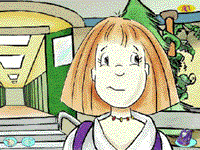




|
Review of
Rockett's New School
 Publisher: Purple Moon
Publisher: Purple Moon
Year: 1997
Suggested Age Range: 8-12
Platform Information: Mac or PC
Reviewer: Megan Murray
Image © Purple Moon. Used with permission.
Is the Game Mathematical?
Rockett's New School does not purport to be mathematical, but is it educational? The educational focus of this game is making thoughtful decisions in a variety of situations. Players are presented with an issue, which they must think through and decide how they, as Rockett, would respond. There are only three possible choices for each decision, a rather limited selection given some of the more complicated decisions Rockett must make in this game. Because of the limited nature of the choices, players must sometimes choose an option that doesn't quite fit or decide on only one when a combination of two is really how they are feeling (although they can later go back and try the other choice). This, combined with the fact that the choices don't have as much effect on the story as the player might expect (see below) can lead children to play in a more capricious way, choosing a decision (e.g. to be mean to Mavis) in order to see the best reaction. However, this type of role playing does involve children in making decisions and the consequences of those decisions.
Is the Game Equitable?
Rockett's New School, "a friendship adventure for girls," is one of a growing number of new games marketed exclusively to girls. Clearly this is not an attempt to make an equitable game, one that will appeal equally to girls and to boys. But there are plenty of "boy games" that make no effort to appeal to girls. Is there any value in this game which is marketed exclusively to girls?
We worry that the content of the story (friendships, which clique to join, how to fit in, how what you're wearing affects that) and some of the activities in it (snooping through things in other people's lockers) tend to play on, if not reinforce, stereotypes about girls. Let alone the fact that the game comes packaged with a flowery T-shirt, a Rockett doll/figure, friendship adventure cards for different characters in the game, and a tube of lipstick. Even worse, there are times that choosing the confident option (the one we'd like girls to choose) can have negative consequences for Rockett, or can result in a snippy image of her, like when she accepts the editor job that she knows she can handle and at which she can excel.
The folks at Purple Moon clearly made an effort designing an inclusive game with a diverse group of characters. However, these portrayals again seem only to stoop to stereotypes, whether in terms of gender (Stephanie is the tall leggy blonde who leads the cool clique, is obsessed with boys and fashion, and is not very nice; Sharla is the bad girl, dressed in a mini-skirt, fishnet stockings, and a biker jacket, and is trying to get you to smoke with her) or in terms of race and ethnicity (Miko is the Asian student who's driven to get good grades; Wolf and Arrow are Native American students whose lockers are filled with nature books and magazines, as well as a book on totems, a picture of a campfire, and a quiver full of arrows). In fact, the girls we saw play this game also noticed this, saying at one point, "Ok we get it, Native American."
Is the Game a Good Game?
I don't imagine this game having a very long life in the play world of many children, girls or boys. There are only so many ways to play this game. For example, one group of girls played it all the way through based on how they would react -- sometimes choosing the brave or confident choice, other times the more nervous or shy choice. Then, they played by choosing the same type of response for each choice (all the happy/confident ones or all the angry/depressed ones).
There is also something artificial about the message that the choices you are making are affecting the direction of the story. If you choose to be nice to Mavis, you help her open her locker, and if you choose to be angry, you have an unpleasant interaction with her. But, either way, you end up at the same next decision point -- the door to your homeroom -- with the same three choices. Although there are consequences for how you respond, it is generally only in that moment, with that person. You do not earn a reputation for treating people poorly that affects how others see and act towards you as it would happen in real life.
A final criticism -- when the game ends, the players don't know it. After the final scene in the girls' bathroom, Rockett leaves the room and stands outside the door. There is nothing to do but go back within the story you have already explored and choose different decisions. But it feels like there is more story to come, and it becomes quite frustrating when you can't find it! One child tester and her mom thought the game had crashed. Another group of girls thought they must have made a wrong choice somewhere along the way.

Back to the top of the page
|



